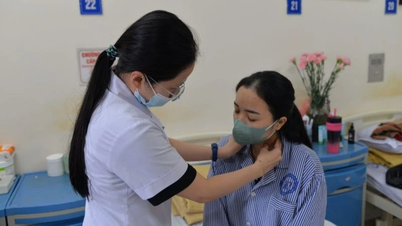When a wet pillow is no longer a matter of weather
Sweating is a natural mechanism that helps the body cool down and regulate body temperature. However, when the amount of sweat that appears at night is so much that the patient has to change clothes or bed sheets, it is called night sweats.

If you wake up every morning to find your pillow or blanket soaked with sweat even though the weather is cool, don't be quick to assume it's normal (Photo: Getty).
The worrying thing is that pathological night sweats are very different in nature from normal hot sweats.
In healthy people, sweating can occur when the room is stuffy, under thick blankets, or during pre-menopause. But in people with the disease, this phenomenon occurs regardless of the weather, even when lying in a cool air-conditioned room or in the middle of cold winter.
According to experts, night sweats related to illness are often persistent, recurring, accompanied by a feeling of fatigue, weight loss, mild fever, digestive disorders or skin discoloration. These are warning signs that the body is experiencing more serious problems.
The exact cause of night sweats caused by cancer is unknown. Common theories include the body’s response to the growth of cancer cells, hormonal imbalances, or changes in body temperature regulation as the disease progresses.
In some cases, fever caused by cancer triggers sweat glands to overwork to cool down, causing the person to sweat profusely at night.
Cancers that commonly cause night sweats
Not all cases of night sweats are cancerous, but many studies note that this is a common symptom in some malignancies.
Lymphoma (cancer of the lymph nodes): This is the leading cause of night sweats. Patients often have a low-grade fever and unexplained weight loss. These three symptoms form the “warning triad” that characterizes the disease.
Leukemia: Cancer of the blood cells, causing the patient to sweat a lot, have pale skin, fatigue, and be susceptible to infection.
Multiple myeloma: Cancer of plasma cells in the bone marrow. Common symptoms include bone pain, muscle weakness, and night sweats.
Breast, lung, and prostate cancers: In advanced or metastatic stages, these cancers can disrupt hormones and body temperature, leading to night sweats.
Melanoma: When it spreads to internal organs, this type of skin cancer can also cause hyperhidrosis.
In addition, some other diseases such as hyperthyroidism, tuberculosis, chronic infections or side effects of drugs can also cause similar symptoms. Therefore, differentiation and medical examination are necessary.
When to see a doctor?
Doctors say that night sweats are only really worrisome when they last for more than 2 weeks, have no known cause, and are accompanied by other symptoms such as fatigue, weight loss, aches and pains, swollen lymph nodes, or fever at night.
At that time, the patient should go to a medical facility for a general check-up, blood test, X-ray and cancer screening if necessary.
Many patients discover cancer at a late stage, simply because they ignore minor symptoms. Meanwhile, if diagnosed early, the chance of successful treatment can reach 80-90%.
Maintaining a healthy lifestyle, getting enough sleep, eating a balanced diet, exercising regularly and having regular health check-ups will help detect abnormalities early.
Source: https://dantri.com.vn/suc-khoe/dau-hieu-tren-goi-va-chan-buoi-sang-co-the-canh-bao-ung-thu-20251025081532611.htm


![[Photo] General Secretary To Lam received the delegation attending the international conference on Vietnam studies](https://vphoto.vietnam.vn/thumb/1200x675/vietnam/resource/IMAGE/2025/10/26/1761456527874_a1-bnd-5260-7947-jpg.webp)
![[Photo] Prime Minister Pham Minh Chinh attends the opening of the 47th ASEAN Summit](https://vphoto.vietnam.vn/thumb/1200x675/vietnam/resource/IMAGE/2025/10/26/1761452925332_c2a-jpg.webp)
![[Photo] Enjoy the Liuyang Fireworks Festival in Hunan, China](https://vphoto.vietnam.vn/thumb/1200x675/vietnam/resource/IMAGE/2025/10/26/1761463428882_ndo_br_02-1-my-1-jpg.webp)


![[Photo] Nhan Dan Newspaper displays and solicits comments on the Draft Documents of the 14th National Party Congress](https://vphoto.vietnam.vn/thumb/1200x675/vietnam/resource/IMAGE/2025/10/26/1761470328996_ndo_br_bao-long-171-8916-jpg.webp)




























































































Comment (0)